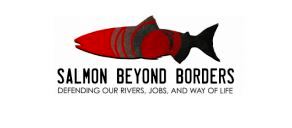 Proposed copper mines in British Columbia have a coalition speaking out on what they say could potentially hurt salmon runs for people on both sides of the border.
Proposed copper mines in British Columbia have a coalition speaking out on what they say could potentially hurt salmon runs for people on both sides of the border.
Salmon navigate through their noses and that sense of smell could be in jeopardy if proposed mines are developed in British Columbia, according to Sarah O’Neal, a fisheries biologist.
“That’s what they use to find predators and prey and mates and also to find their way back to the receiving stream where they were born,” O’Neal says. “So that’s how they know how to get back to spawn is by smelling.”
O’Neal is working with the campaign, Salmon Beyond Borders, which is trying to raise public awareness about the potential impacts of proposed mines in BC. She says it doesn’t take much contact with copper for salmon to be affected.
“Experiments have shown that salmon’s ability to smell can be impacted at just two to ten parts per billion of copper,” O’Neal says. “So, that equates to like two to ten drops of water in an Olympic sized swimming pool. . . so, miniscule amounts.”
O’Neal says those amounts are within water quality standards and can be legally discharged. And as the amount of cooper increases, the effect on salmon does too.
“They can impair their brain function, they can impair their ability to make the transition from salt water to fresh water, you know, all different aspects which can ultimately impact their overall survival,” O’Neal says.
Salmon Beyond Borders has been touring around Southeast Alaska. The group is a coalition funded through different sources including Trout Unlimited and the True North Foundation.
Jill Weitz is the Southeast Outreach Coordinator for Trout Unlimited and she’s working on the Salmon Beyond Borders campaign.
“A big part of this campaign is not against mining, it is speaking for the salmon essentially,” Weitz says.
The group works with conservation groups United Tribal Transboundary Mining Working Group which includes a dozen tribes in Southeast holding informational forums. They are also working with the Tahltan First Nations which has been blocking the Red Chris Mine in BC.
The group wants input in the B.C. permitting process for proposed mines. Three of the proposed mines are in three main shared watersheds shared with Alaska , the Taku, Stikine, and Unuk Rivers.
“We’re trying to look at this as a mining district, not just one project,” Weitz says. “It’s incredible how many projects are being proposed right now. There are over a dozen large scale mines that are in different stages of permitting and development.”
Dr. David Chambers is a Geophysicist and former mine engineer. He’s now with the Centers for Science and Public Participation and is working with Salmon Beyond Borders.
“I think the real issue is how do folks in the U.S. address issues in Canada that could impact them and there’s no real mechanism in place right now to do that,” Chambers says.
He uses the proposed KSM mine as an example of why they have concerns.
“The water treatment plants that they plan to employ there will not discharge water at water quality standards,” Chambers says. “It will still be contaminated above, you know, in excess of those standards. And that contamination will actually reach down into the Unuk River itself. They plan on treating something like 21 billion gallons of water a year and that water treatment is going to have to have to go on in perpetuity.”
Besides the idea of treating the mine’s water forever, Chambers has issues with the cost. He crunched numbers and says that developers would need one billion dollars in a trust fund to come up with enough interest to pay for that kind of water treatment.
British Columbia leaders maintain that mines on transboundary rivers will not damage salmon. The country’s top mining official, Bill Bennett, was in Alaska recently and said they would listen to Alaskans concerns.
But Salmon Beyond Borders is skeptical that they will. The group is looking to the public to help continue what it calls momentum in getting a voice in the permitting process.
For more information about Salmon Beyond Borders, you can go to their website: salmonbeyondborders.org









